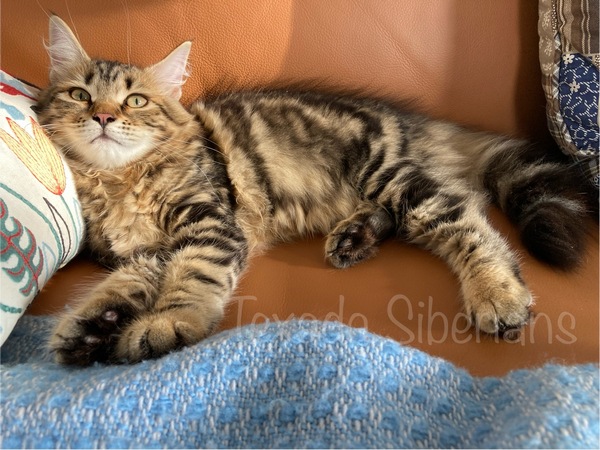Anecdotal Evidence from Allergy Sufferers

Many allergy sufferers have shared their experiences with Siberian kittens, and while it's important to note that these stories are anecdotal and not scientific facts, they provide interesting insights into how some people with mild to moderate allergies have been able to bring a Siberian cat into their homes without suffering major consequences.
Building Tolerance Over Time
For people with mild allergies (think runny nose, mild irritation, etc.), some anecdotal reports suggest that tolerance can be built up over time. Initially, they may experience typical allergic reactions like sneezing or itching, but after a few weeks of living with their new Siberian kitten, their reactions seem to subside. This gradual acclimatization is a common theme in many reports, although, of course, it’s not guaranteed for everyone.
The Role of Air Purifiers
One consistent piece of advice from allergy sufferers is the use of air purifiers. Several people have found that installing an air purifier in their home, particularly one with a HEPA filter, has helped reduce the allergens in the air, making it more tolerable for those sensitive to cat dander. This simple step could be a game-changer for some, reducing reactions and creating a more comfortable living environment.
Spayed/Neutered Siberians and Less Allergens
There are anecdotal claims that spayed or neutered Siberian kittens tend to produce fewer allergens than intact ones. While there's no scientific consensus on this, many pet owners report that after getting their Siberian cat spayed or neutered, their allergic reactions were milder than when the cat was intact. This might be due to hormonal changes and the role of testosterone that could affect the amount of allergen a cat produces, particularly the Fel d 1 protein, which is the primary culprit in allergic reactions. It is also noted that intact adult male cats typically produce the highest level of Fel d 1.

Stress and Increased Allergen Production
Cats, including Siberians, are known to produce more allergens when stressed. A move to a new home, a change in environment, or even interactions with unfamiliar people or animals can trigger an increase in the production of allergens. Many allergy sufferers have observed that their reactions become more intense when the cat is stressed, so keeping a stable, calm environment may help reduce allergens.
Specialized Cat Food and Fel d 1 Protein
Interestingly, some specific cat foods (for example Purina Pro Plan LiveClear) are marketed to help reduce the levels of Fel d 1 protein in a cat’s skin and saliva, which could reduce allergic reactions. While there’s no guarantee this will work for everyone, some allergy sufferers have reported a noticeable decrease in their allergic symptoms after feeding their Siberian kittens this special food.
Severe Allergies and Pet Ownership
It’s essential to remember that for people with severe allergies (such as breathing difficulties, swelling, or a serious anaphylactic response), a Siberian kitten (or any cat) may not be a viable option. These severe reactions are serious, and no cat breed, including Siberians, can guarantee the complete absence of allergens. For these individuals, living with a cat may not be safe, and it's important to consult with a healthcare provider before making a decision.
Light to Mild Allergies May Have a Better Chance
For people with light to mild allergies, there is a better chance they might either build a tolerance to the Siberian kitten or find their symptoms manageable after a few weeks. Siberians are often cited as one of the better breeds for allergy sufferers due to their lower levels of Fel d 1 protein compared to other breeds. However, responses vary from person to person.

Basic Hygiene Tips for Allergy Sufferers
For those willing to try living with a Siberian, basic hygiene practices can make a significant difference. The general rule of thumb is to wash your hands with soap after handling your cat, avoid touching your face (especially eyes), and never let your cat get too close to your face. These simple precautions can help minimize allergic reactions, although they may not eliminate them entirely.
The Number of Cats Matters
It’s also worth noting that the number of cats in the household seems to make a difference for some allergy sufferers. While one Siberian kitten may be manageable, having multiple cats can overwhelm the immune system, making it much harder to tolerate. Many allergy sufferers report that their symptoms become worse as the number of cats increases, so starting with just one is often advised.
Conclusion: No Guarantees, But a Better Chance
While there’s no way to guarantee that a Siberian kitten will be allergy-free for everyone, it does seem that many people with mild to moderate allergies have had positive experiences with the breed. Choosing a Siberian known for producing lower levels of Fel d 1 protein can certainly improve the chances of living comfortably with a cat. However, everyone's body is different, and some people may still react despite these measures.
Ultimately, if you're an allergy sufferer considering a Siberian kitten, it’s important to do your research, speak with your doctor, and understand that while some have had great success, others may not be so fortunate. Every individual’s allergic response is unique, and what works for one person may not work for another. That said, for some, the Siberian kitten has been the perfect match, providing both the joy of a feline companion and the chance to manage their allergies.
More real people stories can be found here.

